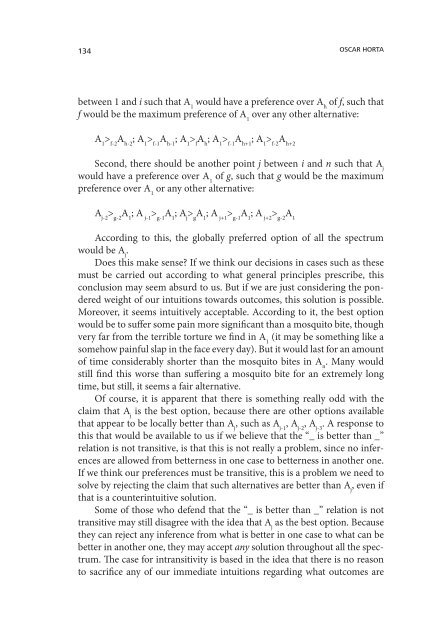Diacritica 25-2_Filosofia.indb - cehum - Universidade do Minho
Diacritica 25-2_Filosofia.indb - cehum - Universidade do Minho
Diacritica 25-2_Filosofia.indb - cehum - Universidade do Minho
You also want an ePaper? Increase the reach of your titles
YUMPU automatically turns print PDFs into web optimized ePapers that Google loves.
134<br />
OSCAR HORTA<br />
between 1 and i such that A 1 would have a preference over A h of f, such that<br />
f would be the maximum preference of A 1 over any other alternative:<br />
A 1 > f-2 A h-2 ; A 1 > f-1 A h-1 ; A 1 > f A h ; A 1 > f-1 A h+1 ; A 1 > f-2 A h+2<br />
Second, there should be another point j between i and n such that A j<br />
would have a preference over A 1 of g, such that g would be the maximum<br />
preference over A 1 or any other alternative:<br />
A j-2 > g-2 A 1 ; A j-1 > g-1 A 1 ; A j > g A 1 ; A j+1 > g-1 A 1 ; A j+2 > g-2 A 1<br />
According to this, the globally preferred option of all the spectrum<br />
would be A j .<br />
Does this make sense? If we think our decisions in cases such as these<br />
must be carried out according to what general principles prescribe, this<br />
conclusion may seem absurd to us. But if we are just considering the pondered<br />
weight of our intuitions towards outcomes, this solution is possible.<br />
Moreover, it seems intuitively acceptable. According to it, the best option<br />
would be to suff er some pain more signifi cant than a mosquito bite, though<br />
very far from the terrible torture we fi nd in A 1 (it may be something like a<br />
somehow painful slap in the face every day). But it would last for an amount<br />
of time considerably shorter than the mosquito bites in A n . Many would<br />
still fi nd this worse than suff ering a mosquito bite for an extremely long<br />
time, but still, it seems a fair alternative.<br />
Of course, it is apparent that there is something really odd with the<br />
claim that A j is the best option, because there are other options available<br />
that appear to be locally better than A j , such as A j-1 , A j-2 , A j-3 . A response to<br />
this that would be available to us if we believe that the “_ is better than _”<br />
relation is not transitive, is that this is not really a problem, since no inferences<br />
are allowed from betterness in one case to betterness in another one.<br />
If we think our preferences must be transitive, this is a problem we need to<br />
solve by rejecting the claim that such alternatives are better than A j , even if<br />
that is a counterintuitive solution.<br />
Some of those who defend that the “_ is better than _” relation is not<br />
transitive may still disagree with the idea that A j as the best option. Because<br />
they can reject any inference from what is better in one case to what can be<br />
better in another one, they may accept any solution throughout all the spectrum.<br />
Th e case for intransitivity is based in the idea that there is no reason<br />
to sacrifi ce any of our immediate intuitions regarding what outcomes are<br />
<strong>Diacritica</strong> <strong>25</strong>-2_<strong>Filosofia</strong>.<strong>indb</strong> 134 05-01-2012 09:38:26











![Programa [pdf] - cehum - Universidade do Minho](https://img.yumpu.com/17305425/1/190x135/programa-pdf-cehum-universidade-do-minho.jpg?quality=85)




